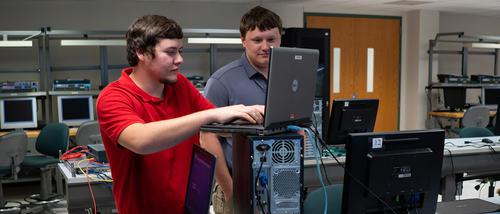Engineering Technology: Electrical & Automation Systems
Continue to main content
Engineering Technology: Electrical and Automation Systems (BS) Degree Map
Explore the courses you'll need to complete your degree.
Electrical Engineering Automation Degree Outcomes & Careers
-
$79k
Engineering Technician
According to the Bureau of Labor Statistics, the mean annual salary for an engineering technician and technologist is $79,740.
-
$78k
Electrical Technician
According to the Bureau of Labor Statistics, the mean annual salary for an electrical and electronic engineering technologist and technician is $78,580.
-
$62k
Electrician
According to the Bureau of Labor Statistics, the mean annual salary for an electrician is $62,350.
As an engineering technology electrical and automation systems major, you’ll earn valuable experience through a senior design capstone course working in teams to solve open-ended industrial projects. You’ll complete a minimum of 120 credit hours to complete this degree, including the general education requirements and at least 39 senior division hours.
Required Courses:
- CH181Basic Principles of Chemistry (3)
- ET160 Basic Electric Circuits (3)
- ET304 Introduction to PLCs (3)
- IM300 Technical Communications (3)
- IM301 Industrial Safety Supervision (3)
- IM309 Science, Technology, & Society (3)
- IM311 Statistical Process Control (3)
- MA137 Precalculus (5)
- MA140 Analytic Geometry & Calculus I (5)
- MN120 Fundamentals of Engineering Design Processes (3)
- MN220 Engineering Economic Analysis (3)
- MN260 Technical Computer Programming Applications (3)
- MN300 Computational Analysis in Engineering Technology (3)
- MN356 Robotic Fundamentals (3)
- MN383 Fluid Power (3)
- MN412 Industrial Capstone Projects (3)
- PH120 Introductory Physics I (5)
- SW207 Understanding Cultural & Social Diversity (3)
Choose 3 hours:
- IM317 Cooperative Industrial Internship (3)
- IM410 Manufacturing Research in a Global Society (3)
Electrical & Automation Systems Option:
- ET110 Fundamentals of Electrical Engineering Technology (1)
- ET164 AC Principles & Circuits (3)
- ET245 Logic Circuits (3)
- ET260 Electronic Circuits Design/Analysis I (3)
- ET365 Industrial Electrical Power (3)
- ET367 Motor Control and Drive Systems (3)
- ET374 Industrial Electronics (3)
- ET468 Industrial Control (3)
- ET471 Topics in Electrical Engineering Technology (3)
- TN255 Microcomputer Maintenance (3)
Some requirements may be fulfilled by coursework in major program.
- Social and Behavioral Sciences – 6 hours
- Constitution Requirement – 3 hours
- Written Communication – 6 hours
- Oral Communication – 3 hours
- Natural Sciences – 7 hours (from two disciplines, one to include a lab)
- Mathematics – 3 hours
- Humanities & Fine Arts – 9 hours (from at least two disciplines)
- Additional requirements – 5 hours (to include UI100 for native students)
- Civics examination
First Year
Fall Semester (13 Hours)
- UI100 (1)
- EN100 (3)
- CH181 (3)
- ET110 (1)
- MA137 (5)
Spring Semester (16 Hours)
- ET160 (3)
- MA140 (5)
- PH120/021 (5)
- General Education (3)
Second Year
Fall Semester (15 Hours)
- ET164 (3)
- ET245 (3)
- MN120 (3)
- MN300 (3)
- General Education (3)
Spring Semester (15 Hours)
- ET260* (3)
- ET304 (3)
- IM300 (3)
- MN260 (3)
- MN383 (3)
Third Year
Fall Semester (15 Hours)
- ET374* (3)
- IM301 (3)
- IM311 (3)
- MN220 (3)
- TN255 (3)
Spring Semester (15 Hours)
- ET365* (3)
- ET468* (3)
- IM309 (3)
- General Education (3)
- General Education (3)
Fourth Year
Fall Semester (15 Hours)
- ET367* (3)
- MN356 (3)
- General Education (3)
- General Education (3)
- General Education (3)
Spring Semester (16 Hours)
- ET471 (3)
- MN412 (3)
- SW207 (3)
- IM317/IM410 (3)
- Elective (4)
*Many major courses are on a set rotation and thus dependent on when prerequisite courses are completed. The actual semester a course is taken may vary based on the rotation.
What will it cost?
Become a Redhawk.
Do more than dream about the future. Take the first steps to make it all happen.
The Engineering Technology (Bachelor of Science) Program is accredited by the Engineering Technology Accreditation Commission of ABET
Engineering and Technology Accreditations
The Department of Engineering and Technology boasts several accreditations for its programs. We're proud of the work we do to make our programs worth it for you. We encourage you to learn more about our student performance and achievement for this accredited program.
Cape Girardeau, MO 63701

